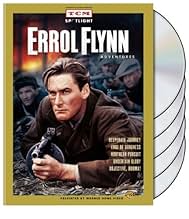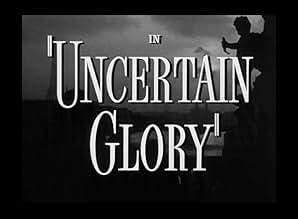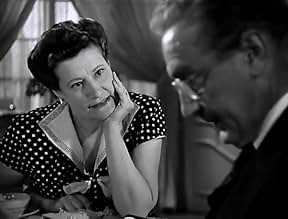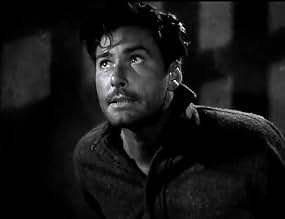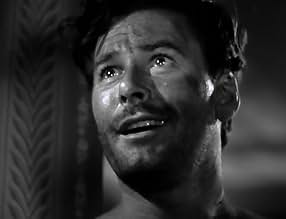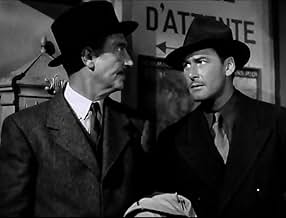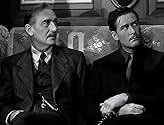CALIFICACIÓN DE IMDb
7.1/10
1.6 k
TU CALIFICACIÓN
Agrega una trama en tu idiomaAfter a career criminal is recaptured and knows he faces the guillotine, he offers to exchange his life for 100 hostages slated for execution by the Germans.After a career criminal is recaptured and knows he faces the guillotine, he offers to exchange his life for 100 hostages slated for execution by the Germans.After a career criminal is recaptured and knows he faces the guillotine, he offers to exchange his life for 100 hostages slated for execution by the Germans.
Douglass Dumbrille
- Police Commissioner LaFarge
- (as Douglas Dumbrille)
Felix Basch
- Gestapo Major
- (sin créditos)
Frederic Brunn
- German Soldier Reporting to Major
- (sin créditos)
Nora Bush
- Townswoman
- (sin créditos)
James Carlisle
- Townsman
- (sin créditos)
Wallis Clark
- Razeau
- (sin créditos)
Pedro de Cordoba
- Executioner
- (sin créditos)
Fred Cordova
- Execution Guard
- (sin créditos)
Opiniones destacadas
Right after Flynn's rape trial Warner put him in "quickie" inexpensive films not knowing how the public would respond to Flynn films. Uncertain Glory was one of them. Most reviewers of the time panned the film as a minor Flynn vehicle and heroic Flynn nonsense. However, as time has passed some modern day reviewers have re-evaluted this film and some have commented that Flynn gives a really good performance in a pretty darn good cat and mouse drama. And I totally agree. The story is interesting and the interplay between Flynn and Oscar-winning(The Watch on the Rhine) Paul Lukas is terrific. I think this is maybe Flynn's most underrated film. Whenever I watch it I imagine by Flynn's character the ending could have gone quite different and been more unpredictable but knowing the times(1944) and still in the midst of WWII the ending had to be what it was... Patriotic. Again, I think "Uncertain Glory" is a very underrated Flynn movie. *** of **** rating...easy.
The story takes place in Poitou in the Gartempe Valley.A really nice valley ,but which does not look like the one depicted in the film.THe river is actually hemmed in by steep banks .And how strange to hear people from la Vienne department -who have a marked accent - speak English! Geographically and historically ,this is a deeply inaccurate movie.Without any paper ,Picard can travel without any problem from the small village near Poitiers to Paris .Made in 1944,it was ,like so many others ,a propaganda movie ("La Marseillaise" can be heard at the end of Walsh's work.) Forget the background and you have an absorbing movie,the subject of which is still relevant today.Flynn portrays Picard a sentenced-to-death man,who,on his way to the guillotine ,is saved by the gong (He will say later: "the only help I got from the sky was bombs").But a Javertesque cop (Lukas) is hot on his heels and he arrests him again.
A saboteur blew up a bridge over La Gartempe .The reprisals are terrible:if the "criminal" does not surrender by Tuesday ,one hundred French hostages will be shot.Picard suggests a deal to the cop "I 'd rather be shot than put my head in the guillotine ;so let's make a deal: I 'll tell the Gestapo I'm the saboteur and a hundred lives will be spared.But give me three days just to live..." These three days will be full of unexpected twists,of treason,of nasty tricks (the inhabitants of the village trying to find a scapegoat:"you are inspired by the devil" says the priest;the old lady suggesting an old man he give him up cause he 's got no family) ,of moments of happiness (Picard finds love with the gorgeous Louise -a brunette,Lucile Watson ,who I first mistook for Jennifer Jones-) ,but also of doubt and fear.Interest is sustained till the very last pictures.Flynn gives a mature performance ,far from his dashing usual heroes.Excellent supporting cast.
"Uncertain Glory" might have influenced Henri Jeanson and Christian-Jaque when they made their underrated " Le Repas des Fauves" (1964).
A saboteur blew up a bridge over La Gartempe .The reprisals are terrible:if the "criminal" does not surrender by Tuesday ,one hundred French hostages will be shot.Picard suggests a deal to the cop "I 'd rather be shot than put my head in the guillotine ;so let's make a deal: I 'll tell the Gestapo I'm the saboteur and a hundred lives will be spared.But give me three days just to live..." These three days will be full of unexpected twists,of treason,of nasty tricks (the inhabitants of the village trying to find a scapegoat:"you are inspired by the devil" says the priest;the old lady suggesting an old man he give him up cause he 's got no family) ,of moments of happiness (Picard finds love with the gorgeous Louise -a brunette,Lucile Watson ,who I first mistook for Jennifer Jones-) ,but also of doubt and fear.Interest is sustained till the very last pictures.Flynn gives a mature performance ,far from his dashing usual heroes.Excellent supporting cast.
"Uncertain Glory" might have influenced Henri Jeanson and Christian-Jaque when they made their underrated " Le Repas des Fauves" (1964).
Excellent WW2 movie set in France about a convicted murderer named Jean Picard (Errol Flynn) who is about to be executed when an air raid allows him to escape. Police Inspector Marcel Bonet (Paul Lukas) tracks him down but, before he can bring him in, Picard offers to give his life to save the lives of some French hostages being held by the Nazis. Bonet agrees but the question is will Picard go through with it?
Raoul Walsh directed this underrated little gem from Warner Bros. Errol Flynn and Paul Lukas have a good chemistry. Most of the film centers around the relationship between their two characters. Lovely Jean Sullivan plays the naive young girl who falls for Flynn. Nice supporting cast includes Lucile Watson, Dennis Hoey, Sheldon Leonard, and Faye Emerson. A really good war drama that raises some nice moral questions, as well as having doses of humor and even some romance. And, of course, the added historical value many of these films have. WB is probably my favorite studio of the '30s & '40s and their war films are a good example of why. They made the best and most interesting movies to help the war effort. Always with good actors, writers, directors, and a solid, reliable production.
Raoul Walsh directed this underrated little gem from Warner Bros. Errol Flynn and Paul Lukas have a good chemistry. Most of the film centers around the relationship between their two characters. Lovely Jean Sullivan plays the naive young girl who falls for Flynn. Nice supporting cast includes Lucile Watson, Dennis Hoey, Sheldon Leonard, and Faye Emerson. A really good war drama that raises some nice moral questions, as well as having doses of humor and even some romance. And, of course, the added historical value many of these films have. WB is probably my favorite studio of the '30s & '40s and their war films are a good example of why. They made the best and most interesting movies to help the war effort. Always with good actors, writers, directors, and a solid, reliable production.
Uncertain Glory (1944)
A rather good war drama, a bit pre-packaged but very well done, as pretty much all Warner Bros films were from this era. Errol Flynn was at a point in his career when he wanted to become a "leading man" in the broader sense, not just a sword-fighting (and handsome) daredevil.
Key to the movie is the quasi-propaganda quality of the movie, set and made during World War II. That's not a bad thing—it's not government propaganda at all, but simply rooting for the good guys, and putting the French (our allies) in a good light (which they deserve).
The plot twist is simple and comes out early, so this gives nothing away—Flynn is a petty criminal who killed someone in a moment of panic, almost by accident, and he's about to have his head chopped off. But then an opportunity (dramatically and beautifully done) suggests a different way to die: for the Cause. The question is whether he can follow through, or whether he'll follow his new romantic (and idealized) love interest to a free new life.
It's all rather good even if contained in movie expectations. The police detective who is guarding and helping Flynn's character is a stalwart of the period, Paul Lukas, and he adds a needed level of gravity and even complexity to the interactions. Flynn is a cheerful presence—very American (even though he's from Tasmania!)—but he often responds rather than leads his scenes. The third lead is the woman, played with wonderful honesty by Faye Emerson.
Part of enjoying these WWII movies is knowing their context, and getting how the audience was wild for a sense of the war, of knowing who was winning, and of sensing how the scene worked, what the French were really like, what the chances were for a soldier caught up in it all. Their brother, their son. And that's kind of what this movie is about, showing heroism, and goodness, and how the war is a just cause and the Nazis are truly horrible (they were). Flynn does what he needs to do here, and if there is artifice and some lack of total believability, that's almost necessary so that a safe distance and cushion is in place.
Not an essential movie, but a really good one, especially if you already like this kind of film and this era.
A rather good war drama, a bit pre-packaged but very well done, as pretty much all Warner Bros films were from this era. Errol Flynn was at a point in his career when he wanted to become a "leading man" in the broader sense, not just a sword-fighting (and handsome) daredevil.
Key to the movie is the quasi-propaganda quality of the movie, set and made during World War II. That's not a bad thing—it's not government propaganda at all, but simply rooting for the good guys, and putting the French (our allies) in a good light (which they deserve).
The plot twist is simple and comes out early, so this gives nothing away—Flynn is a petty criminal who killed someone in a moment of panic, almost by accident, and he's about to have his head chopped off. But then an opportunity (dramatically and beautifully done) suggests a different way to die: for the Cause. The question is whether he can follow through, or whether he'll follow his new romantic (and idealized) love interest to a free new life.
It's all rather good even if contained in movie expectations. The police detective who is guarding and helping Flynn's character is a stalwart of the period, Paul Lukas, and he adds a needed level of gravity and even complexity to the interactions. Flynn is a cheerful presence—very American (even though he's from Tasmania!)—but he often responds rather than leads his scenes. The third lead is the woman, played with wonderful honesty by Faye Emerson.
Part of enjoying these WWII movies is knowing their context, and getting how the audience was wild for a sense of the war, of knowing who was winning, and of sensing how the scene worked, what the French were really like, what the chances were for a soldier caught up in it all. Their brother, their son. And that's kind of what this movie is about, showing heroism, and goodness, and how the war is a just cause and the Nazis are truly horrible (they were). Flynn does what he needs to do here, and if there is artifice and some lack of total believability, that's almost necessary so that a safe distance and cushion is in place.
Not an essential movie, but a really good one, especially if you already like this kind of film and this era.
Errol Flynn always wanted to prove that he was a dramatic actor of range, not an athletic non-entity who was always demonstrating his abilities as a horseman, a fighter, or a swordsman. That his best adventure films did show him as more than just an acrobat he barely understood. He wanted to play normal types. But normal types look more like Walter Matthau or Paul Muni or Allan Jenkins - they are not the strikingly handsome Flynn.
In 1944 Flynn did this film which was a war picture but not like DIVE BOMBER or OBJECTIVE: BURMA. The film was about a French criminal who had committed a murder and was tried and convicted for that homicide. He is able to escape the guillotine when a bomb hits the prison just as the execution is about to occur. He flees, and manages to get into the countryside. Pursuing him is Paul Lucas, the French police inspector who arrested him originally. Lucas finds Flynn, but at that time an act of sabotage against the Nazis occurs. When the Nazis threaten to kill 100 French hostages unless the saboteurs appear, Flynn offers Lucas a "devil's" choice: If Lucas will not act for the next few days, Flynn will surrender himself to the Nazis as the saboteur (he prefers being shot by a firing squad rather than being guillotined). Lucas has little real choice - unless he is willing to do the same thing instead of Flynn. But will Flynn keep his word or not? As Flynn meets a young girl and finds that they can flee away together, the audience wonders if he'll do the heroic thing or not.
Flynn is pretty good in this cynical part. It is obvious, once he makes the offer to Lucas, that he really planned not to go through with it. It is also true that as the moment of truth arises he gradually sees the hideous tragedy that his self-interest is likely to cause many families. The glimpse at occupied French society is also good, showing the victims and the collaborators. It is almost as good as the picture of that society in THIS LAND IS MINE.
Yet the film, produced by a company that Flynn was involved in, and selected by him, failed at the box office. The public did not quite accept a thinking man's Errol Flynn instead of the adventurous sexy star of THE SEA HAWK or GENTLEMAN JIM. It set back further attempts by Flynn to find straight dramatic parts. It also verified that Jack Warner, Flynn's studio boss, was a really smart man in knowing what the public liked or did not like for their stars.
In 1944 Flynn did this film which was a war picture but not like DIVE BOMBER or OBJECTIVE: BURMA. The film was about a French criminal who had committed a murder and was tried and convicted for that homicide. He is able to escape the guillotine when a bomb hits the prison just as the execution is about to occur. He flees, and manages to get into the countryside. Pursuing him is Paul Lucas, the French police inspector who arrested him originally. Lucas finds Flynn, but at that time an act of sabotage against the Nazis occurs. When the Nazis threaten to kill 100 French hostages unless the saboteurs appear, Flynn offers Lucas a "devil's" choice: If Lucas will not act for the next few days, Flynn will surrender himself to the Nazis as the saboteur (he prefers being shot by a firing squad rather than being guillotined). Lucas has little real choice - unless he is willing to do the same thing instead of Flynn. But will Flynn keep his word or not? As Flynn meets a young girl and finds that they can flee away together, the audience wonders if he'll do the heroic thing or not.
Flynn is pretty good in this cynical part. It is obvious, once he makes the offer to Lucas, that he really planned not to go through with it. It is also true that as the moment of truth arises he gradually sees the hideous tragedy that his self-interest is likely to cause many families. The glimpse at occupied French society is also good, showing the victims and the collaborators. It is almost as good as the picture of that society in THIS LAND IS MINE.
Yet the film, produced by a company that Flynn was involved in, and selected by him, failed at the box office. The public did not quite accept a thinking man's Errol Flynn instead of the adventurous sexy star of THE SEA HAWK or GENTLEMAN JIM. It set back further attempts by Flynn to find straight dramatic parts. It also verified that Jack Warner, Flynn's studio boss, was a really smart man in knowing what the public liked or did not like for their stars.
¿Sabías que…?
- TriviaErrol Flynn was criticized for playing heroes in World War II movies. Tony Thomas in his book 'Errol Flynn: The Spy Who Never Was' states that Flynn had tried to enlist in every branch of any armed services he could but was rejected as unfit for service on the grounds of his health. He had a heart condition, tuberculosis, malaria and a back problem. Flynn felt he could contribute to America's war effort by appearing in such films as Rebelión (1943); El misterio de las nieves (1943); El escuadrón suicida (1941), Aventuras en Birmania (1945) and Tres dias de vida (1944). Reportedly, Flynn was at his most professional and co-operative he ever was whilst working on Second World War movies. The studios apparently did not diffuse the criticism of Flynn's state-of-health as they wished to keep it quiet for fear of his box-office draw waning.
- ErroresAbout 1:20 into the film, there is a scene where the French police are coming into the town at night. One, on a motorcycle, rounding a corner, seemingly slips on the wet cobblestones and crashes in front of the camera - the shadow of his head flashes across the bottom of the screen and the sound of his presumed crash can be heard.
- Citas
Jean Picard: [indignantly to the barber just before he is to be sent to face the guillotine] My head comes off as it is!
- ConexionesFeatured in The Adventures of Errol Flynn (2005)
- Bandas sonorasLa Marseillaise
(1792) (uncredited)
Music by Claude Joseph Rouget de Lisle
Variations in the score often
Selecciones populares
Inicia sesión para calificar y agrega a la lista de videos para obtener recomendaciones personalizadas
- How long is Uncertain Glory?Con tecnología de Alexa
Detalles
- Tiempo de ejecución1 hora 42 minutos
- Color
- Relación de aspecto
- 1.37 : 1
Contribuir a esta página
Sugiere una edición o agrega el contenido que falta


